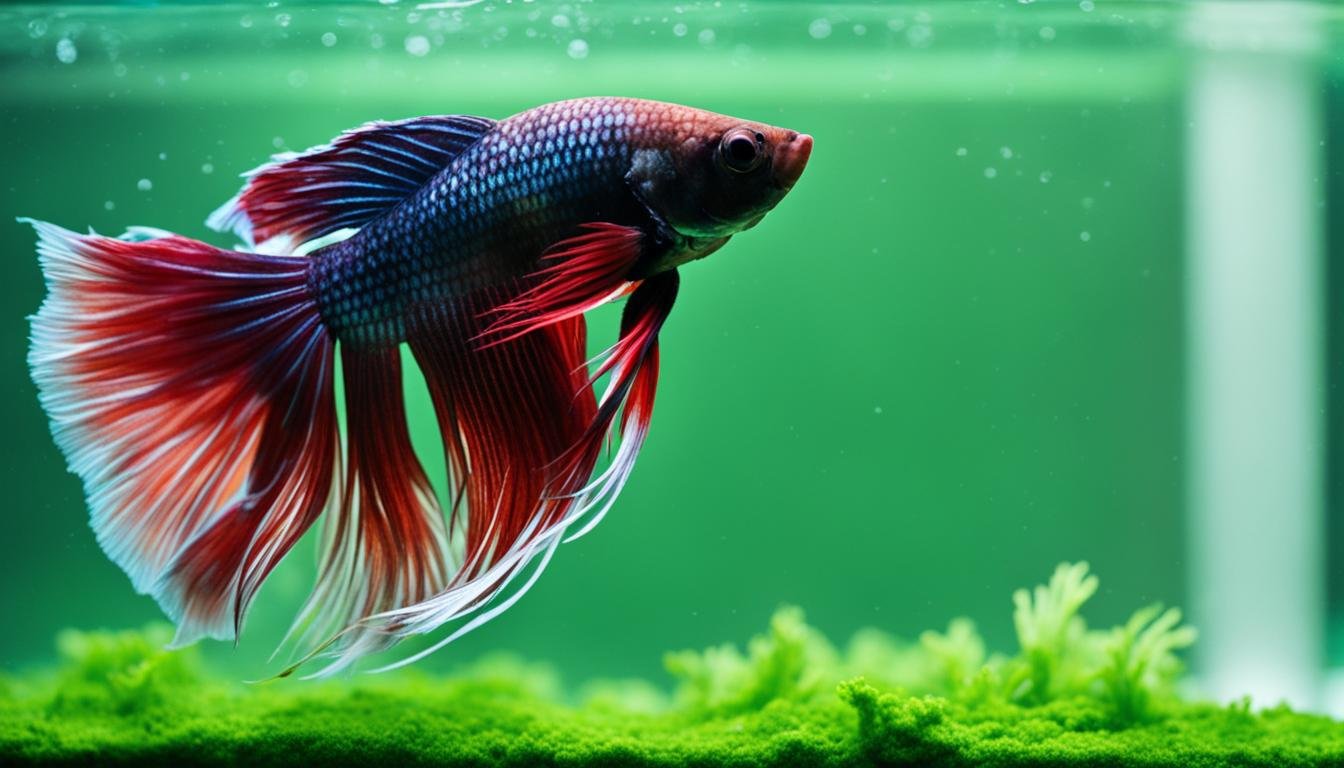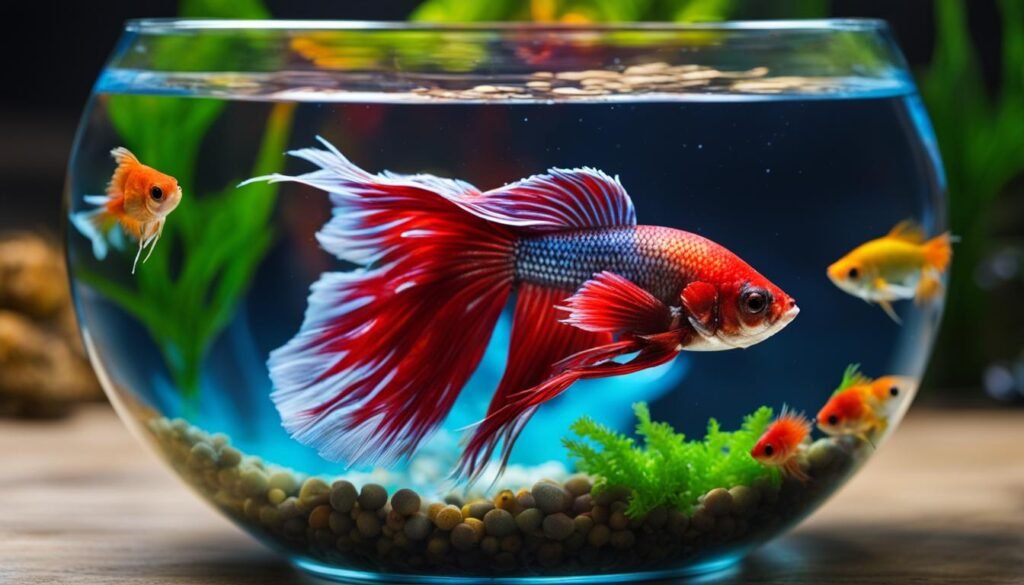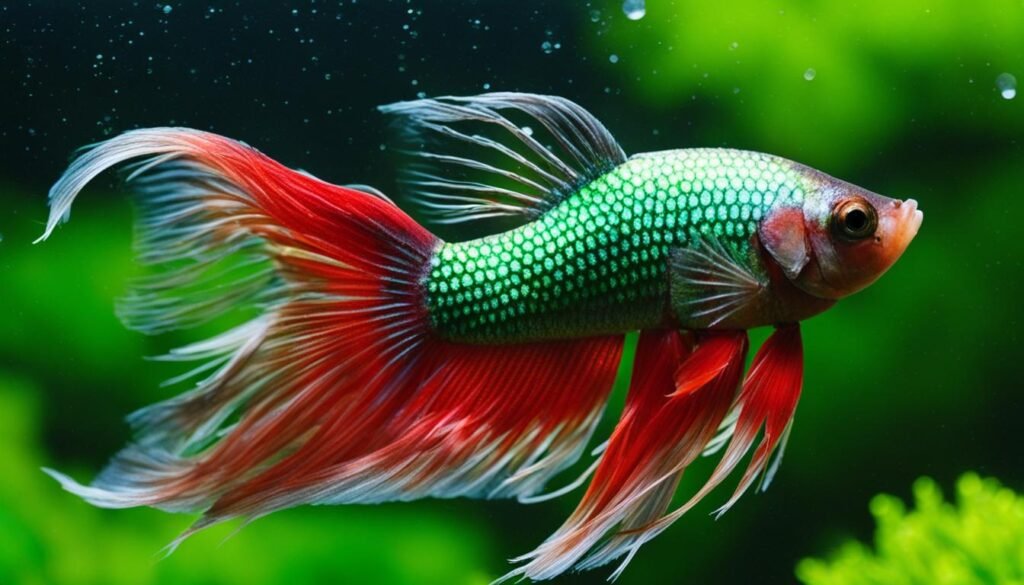Your cart is currently empty!

Do Betta Fish Eat Algae? Uncover the Diet Facts!
When it comes to the diet of betta fish, one question that often arises is whether they eat algae. In this article, we will explore the relationship between betta fish and algae, the importance of a balanced diet, alternative foods for betta fish, potential risks of algae, and tips for feeding betta fish in a healthy way. Let’s dive in and uncover the diet facts!
First and foremost, betta fish are known to eat algae as part of their normal foraging behavior. However, they are not primarily interested in the algae itself, but rather the small crustaceans, bugs, invertebrates, and larvae that live in the algae. Algae does not provide much nutrition for betta fish, but the protein-rich snacks found within the algae are a preferred food source. While betta fish can eat algae to supplement their diet, it is still important to provide them with a complete pelleted diet to ensure they receive all the necessary nutrients.
Key Takeaways:
- Betta fish eat algae as part of their foraging behavior, but it is not their primary source of nutrition.
- They are more interested in the small crustaceans, bugs, invertebrates, and larvae that live in the algae.
- Algae itself does not provide much nutrition, but the protein-rich snacks within the algae are a preferred food source.
- It is important to provide betta fish with a complete pelleted diet to ensure they receive all the necessary nutrients.
- Feeding betta fish a balanced diet helps maintain their overall health and prevents the risk of overfeeding.
Understanding the Relationship Between Betta Fish and Algae
The presence of algae in fish ponds and tanks is common, as it tends to thrive in the presence of fish, water, and sunlight. However, excessive algae growth can cause problems, such as clogging filters and depleting oxygen levels. While fish, including betta fish, may eat algae, it is primarily for the bugs and other organisms that live within the algae. Algae itself does not provide much nutrition for betta fish. Therefore, relying solely on algae for their diet is not recommended. Additionally, it is important to control algae growth to maintain a healthy aquatic environment for betta fish.
Controlling Algae Naturally
- One natural way to control algae growth in betta fish tanks is by ensuring proper filtration and water circulation. A well-maintained filter can help remove excess nutrients that contribute to algae growth.
- Introducing aquatic plants can also help control algae by competing for nutrients and reducing available sunlight for algae growth.
- Limiting the duration of light exposure in the aquarium can also be effective in preventing excessive algae growth. Consider using a timer to regulate the lighting period to around 8-10 hours per day.
By implementing these natural methods, you can help maintain a balanced ecosystem in your betta fish tank and minimize the risk of algae-related issues.
Note: It is important to research the specific needs of your betta fish species and consult with a knowledgeable aquarium specialist when making changes to your tank setup or implementing natural algae control methods.
The Importance of a Balanced Diet for Betta Fish

When it comes to keeping our betta fish healthy and thriving, providing them with a balanced diet is of utmost importance. While betta fish can obtain some nutrients from eating algae, it is crucial to offer them a diverse and complete diet.
Maintaining a nutritious and well-rounded feeding routine ensures that our betta fish receive all the necessary vitamins and minerals they need to thrive. While pellets are the preferred choice for betta fish as a staple food, it is also essential to offer them a variety of alternative foods.
Benefits of a Balanced Diet for Betta Fish:
- Ensures optimal growth and development
- Supports immune system health
- Promotes vibrant colors
- Prevents nutritional deficiencies
Choosing high-quality betta fish food that contains sufficient protein and meets their nutritional needs is crucial. By feeding our betta fish a diverse diet, we can provide them with additional nutrients and stimulate their natural hunting instincts.
Remember, maintaining a clean and well-balanced aquarium environment is also essential for the overall health and well-being of our betta fish. By prioritizing their nutrition and environment, we can ensure that they lead happy and healthy lives.
Alternative Foods for Betta Fish
When it comes to feeding betta fish, there are alternative food options that can provide variety and additional nutritional benefits to their diet. While pellets are the preferred choice for their staple food, offering alternatives can be stimulating for betta fish and add some excitement to their mealtimes.
One option for alternative foods is live foods. These can include brine shrimp, mosquito larvae, and bloodworms. Live foods not only offer nutritional value but also mimic the natural hunting behavior of betta fish. However, it’s important to note that live foods may carry the risk of introducing parasites into the tank, so proper care and precautions should be taken.
Frozen betta foods are another alternative that provides similar nutritional value to live foods but without the risk of parasites. They offer convenience and can be easily stored. However, it is recommended to thaw and rinse them before feeding to prevent any potential issues.
Here are some alternative foods for betta fish:
- Live foods such as brine shrimp, mosquito larvae, and bloodworms
- Frozen betta foods
- Freeze-dried foods (soaked before feeding)
It is important to research and choose high-quality alternative foods that meet the nutritional needs of betta fish. Adding variety to their diet can help keep them healthy and happy. Remember to always feed in moderation and remove any uneaten food to maintain water quality.
Potential Risks of Algae for Betta Fish
When it comes to the presence of algae in betta fish tanks, there are some potential risks that every betta fish owner should be aware of. While algae itself may not be harmful to betta fish, certain types of algae, such as blue-green algae or cyanobacteria, can be toxic. These algae blooms can lead to a decrease in oxygen levels and cause histopathological changes in the organs of fish. Additionally, these toxic algae blooms can also be harmful to other pets and even humans.
Algae blooms are more common in systems with high nitrate pollution. Therefore, it is crucial to regularly monitor the water quality in betta fish tanks and take appropriate measures to prevent and control harmful algae growth. Maintaining a clean and well-balanced aquarium environment is essential for the health and well-being of betta fish.
The potential risks of algae in betta fish tanks include:
- Toxicity of certain types of algae, such as blue-green algae or cyanobacteria
- Decreased oxygen levels in the water
- Histopathological changes in the organs of fish
- Potential harm to other pets and humans
By staying vigilant and taking proactive steps to prevent and control harmful algae growth, betta fish owners can create a safe and healthy environment for their fish.
Tips for Feeding Betta Fish in a Healthy Way

Feeding betta fish in a healthy way is essential for their well-being and longevity. Here are some tips to ensure that your betta fish receive the proper nutrition and care:
Vary their diet:
While pellets are the staple food for betta fish, it is beneficial to offer them a variety of foods. This can include live or frozen options such as brine shrimp, mosquito larvae, and bloodworms. Varying their diet not only provides additional nutritional benefits but also keeps them mentally stimulated and engaged during feeding time.
Feed in small portions:
Betta fish have small stomachs and can easily suffer from overfeeding. It is best to feed them small portions of food that can be consumed within a few minutes. This helps prevent bloating and other digestive issues. If there is any uneaten food remaining after feeding, promptly remove it from the tank to maintain water quality.
Choose high-quality betta fish food:
When selecting betta fish food, opt for high-quality options that are specifically formulated for their nutritional needs. Look for pellets that contain sufficient protein and essential nutrients. Avoid low-quality or generic fish food that may lack the necessary nutrients to keep your betta fish healthy.
Monitor their appetite:
Each betta fish has its own unique appetite. Some may eat more while others may eat less. It is important to monitor their feeding habits and adjust the amount of food accordingly. Overfeeding can lead to obesity and other health issues, while underfeeding can result in malnutrition. Regularly observe their behavior and consult a veterinarian if you are unsure about their dietary needs.
By following these tips, you can ensure that your betta fish receive a balanced diet and proper care. Remember, a healthy diet is key to their overall well-being and happiness.
Conclusion
In conclusion, meeting the nutritional needs of betta fish is crucial for their overall health and well-being. While betta fish can eat algae as part of their natural foraging behavior, it is not the primary source of nutrition for them.
Providing betta fish with a balanced diet is essential, and pellets are the preferred choice as a staple food. These pellets ensure that betta fish receive all the necessary nutrients to maintain their body size and stay healthy. However, it is also beneficial to vary their diet by occasionally offering alternative foods such as live or frozen options.
It is important to be mindful of the potential risks associated with algae blooms. Certain types of algae, like blue-green algae or cyanobacteria, can be toxic to betta fish and other pets. To prevent and control harmful algae growth, regular monitoring of water quality and maintaining a clean and well-balanced aquarium environment is essential.
By understanding and meeting the dietary needs of betta fish, we can ensure their long-term health and longevity. So, remember to provide a balanced diet, control algae growth, and maintain a clean and healthy aquatic environment for our beloved betta fish.
FAQ
Do betta fish eat algae?
Yes, betta fish are known to eat algae as part of their normal foraging behavior.
Why do betta fish eat algae?
Betta fish primarily eat algae to obtain the small crustaceans, bugs, invertebrates, and larvae that live within the algae.
Is algae a nutritious food for betta fish?
Algae itself does not provide much nutrition for betta fish, but the protein-rich snacks found within the algae are a preferred food source.
Can betta fish survive solely on algae?
While betta fish can eat algae as a supplement to their diet, it is important to provide them with a complete pelleted diet to ensure they receive all the necessary nutrients.
What happens if there is excessive algae growth in my betta fish tank?
Excessive algae growth can cause problems such as clogging filters and depleting oxygen levels, which can be harmful to betta fish and other aquatic life.
What should I feed my betta fish besides algae?
It is recommended to feed betta fish a complete pelleted diet as their main food source. However, live or frozen foods such as brine shrimp, mosquito larvae, and bloodworms can be offered as a supplement for variety and additional nutritional benefits.
Are there any risks associated with algae in betta fish tanks?
Certain types of algae, such as blue-green algae or cyanobacteria, can be toxic and harmful to betta fish. It is important to take measures to prevent and control harmful algae blooms to maintain a healthy aquatic environment.
How often and how much should I feed my betta fish?
Most betta fish should be fed a small amount of pellets once or twice a day. It is best to feed them in small portions that can be consumed within a few minutes to prevent overfeeding.
Can I offer freeze-dried foods to my betta fish?
Yes, freeze-dried foods can be offered to betta fish, but they should be soaked before feeding to prevent bloating.
How do I maintain a healthy feeding routine for my betta fish?
It is important to choose high-quality betta fish food that contains sufficient protein and meets their nutritional needs. Varying their diet and avoiding overfeeding will help maintain their health and prevent potential issues.
Leave a Reply